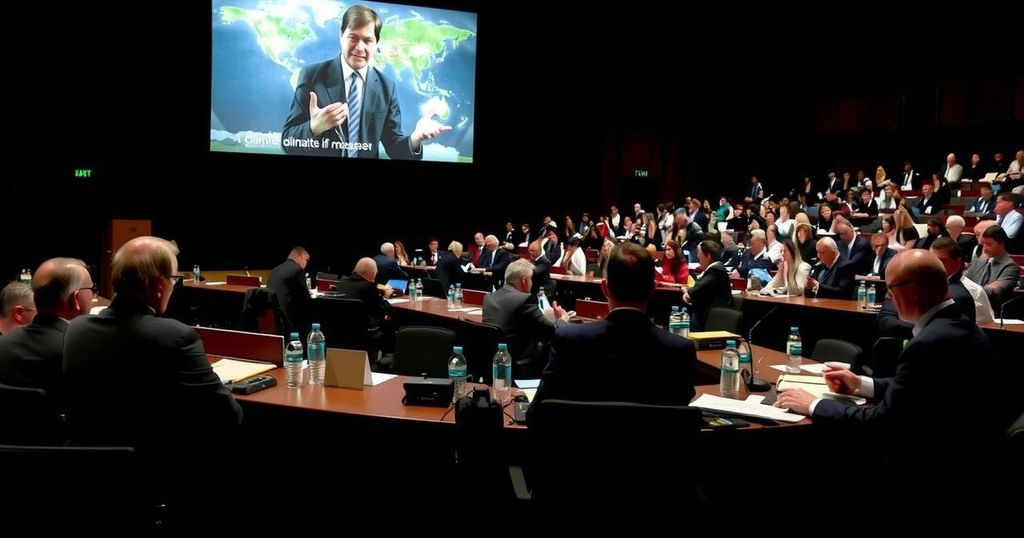Tensions arose at COP29 in Baku over a draft climate agreement perceived to undermine previous commitments to reduce fossil fuel use. Key nations, including the UK and EU, labeled the draft as “unacceptable.” Developing countries expressed dissatisfaction over the lack of financial support, emphasizing past promises made under the Paris Agreement. The ongoing discussions highlight the need for transparency in funding and a commitment to ambitious climate action moving forward.
At the COP29 climate talks in Baku, Azerbaijan, tensions have escalated as several leading nations expressed concerns that a draft agreement may represent a regression from previous commitments to reduce fossil fuel use. United Kingdom Energy Minister Ed Miliband cautioned that stagnation in progress would be seen as a retreat, and he emphasized the need for accountability in the outcome of the negotiations. The United Kingdom, European Union, New Zealand, and Ireland labeled the proposed agreement as “unacceptable.” Meanwhile, developing nations voiced frustration over the absence of funding to support their climate change initiatives.
With nearly 200 countries participating, the central issue is the balance between promises of financial assistance from developed nations and firm global commitments to eliminate fossil fuel reliance. Some developing nations and key oil-producing countries are resistant to implement rigorous measures that could impede their economic development. EU Climate Action Commissioner Wopke Hoekstra criticized the draft as “unbalanced, unworkable and unsubtle,” indicating a dissonance in expectations among the parties involved.
US Climate Envoy John Podesta expressed astonishment that the draft did not reflect previous agreements made at last year’s COP28 in Dubai. The sentiments were echoed by Samoan Minister Cedric Schuster, who underscored the detrimental effects of undermining the progress established in that earlier meeting. Eamon Ryan, Ireland’s Minister for the Environment, reminded attendees of the urgency to prioritize ambitious mitigation efforts in tackling climate change.
Negotiators expressed dissatisfaction with Azerbaijan’s hosting of the talks, asserting that the draft agreement seems to favor the perspectives of oil-rich Arab nations and the Like-Minded countries, which include Saudi Arabia, China, India, and Bolivia. Concerns have been raised that the Saudi position frames the agreement as merely an option rather than an authoritative directive. Minister Ryan remarked that the prevailing approach must shift away from this misinterpretation.
Moreover, developing nations have voiced allegations of backtracking from developed countries on previous commitments made in the landmark Paris Agreement, particularly regarding financial support aimed at transitioning away from fossil fuels and preparing for extreme weather scenarios. The latest financing proposal, which surfaced on Thursday, notably lacks specific monetary allocations. Bolivia’s lead negotiator, Diego Pacheco, criticized the proposal as an affront to the global south’s demands for equitable financial assistance. The G77+China coalition, representing developing nations, has called for a target of $1.3 trillion by 2030 from a combination of governmental and private sector contributions but lamented the absence of any firm figure in the discussions.
Developing nations particularly desire transparency regarding the distinction between grants and loans, highlighting their concerns about exacerbating existing debt burdens due to reliance on loans. Moving forward, the apparent disconnect between aspirations and commitments remains a pivotal challenge for delegates at COP29.
The COP29 climate talks are part of the ongoing global discussions aimed at addressing climate change and its far-reaching effects. These talks involve representatives from nearly 200 nations who gather to negotiate agreements that will ultimately shape the future of climate policy and action globally. The current discussions are set against the backdrop of previous commitments made during past COP meetings, including the significant Paris Agreement in 2015, which sought to mobilize funding for developing nations to mitigate the impacts of climate change. These negotiations are critical for ensuring the accountability of developed nations in providing necessary resources for transition and adaptation efforts in poorer countries.
The COP29 climate talks in Baku have highlighted significant tensions between developed and developing nations over the proposed draft agreement on fossil fuel usage and financing for climate change initiatives. Key representatives have articulated their concerns over a perceived drift from established commitments, emphasizing that progress from previous talks must be safeguarded. As discussions continue, the balance of financial support and stringent climate action remains a vital focus, underscoring the importance of equitable solutions to combat climate change globally.
Original Source: www.bbc.com






